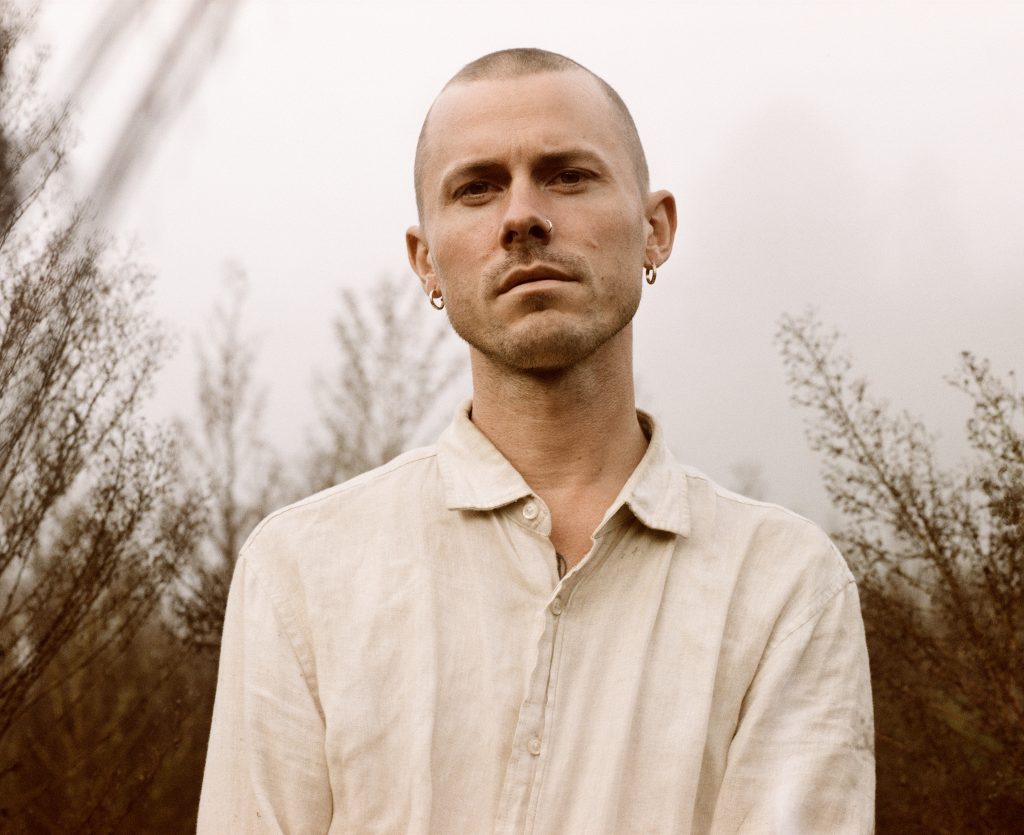
When Ryan Gustafson finished recording Transmigration Blues, his fourth and bestalbum under the name The Dead Tongues, in the summer of 2019, he slumped into a month-long haze of depression. For two decades, Gustafson—a preternaturally sensitive soul, interested in the mystic but grounded by his love of quiet woods and open deserts—had made many albums with various bands and under assorted guises. This one however, had left him wounded, momentarily empty. He couldn’t write songs, couldn’t concentrate, couldn’t summon any enthusiasm for tapping into his emotions. Even the shows he played meant going through the motions. “The deeper wells of my being had run dry,” he remembers of how he felt when he returned to his mountain cabin, deep in a North Carolina holler. “There was just this big, open space.”
In the years since recording his 2018 breakthrough, Unsung Passage, Gustafson had built words and songs of intense emotional reckoning. He had wrestled with relationships that failed spectacularly. He had contemplated growing up in and then apart from a devoted religious household. He had surveyed the damage of living hard in his 20s, partying in the back of vans as he prowled the interstates of the United States, reckless and free.
Before any of the songs detailing these reckonings emerged, Gustafson had the title Transmigration Blues—a reference to the Buddhist concept of a dead body’s soul migrating into another host. For Gustafson, though, it also represents the “little deaths” we all experience as we grow and evolve, the lessons and fables (however indirect) we take with us as we molt and slip from an old skin into our next one. This baggage was daunting, Gustafson admits, but he’s better for having sorted through it, having pulled it from his body at last. “It took a while to come back from,” he says. “But I would rather walk out of the studio feeling that way instead of it just being another day at the office.”
Those thoughts—powerful personal reflections on his place in the world, tardy attempts to find meaning in the moments of life he thought he’d left behind—are the core of Transmigration Blues, an album that transmogrifies heavy emotional burdens into some of the most disarming folk-rock you’ll ever hear. From the graceful string-swept recollections of “Deep Water, Strange Wind” to the radiant calls and responses of “Bama Boys Circa 2005,” Gustafson drags past darkness into present light. Transmigration Blues gets to the idiosyncratic heart and unorthodox past of Gustafson, who lives the contemplative rural life about which many of his peers simply sing.
In the past, The Dead Tongues have been a pragmatically sparse project. All his adult life, Gustafson has been an itinerant sort, whether hitchhiking across the West or simply touring hard. His songs as The Dead Tongues tended toward elemental arrangements that could quickly be stripped onstage to their acoustic essence, should he need to perform them alone. But for more than a year, Gustafson has rented a century-old cabin on a 100-acre spread amid the Blue Ridge Mountains, writing songs in a little triangular greenhouse flooded by light.
This newfound stability, coupled with the wider audience that the tender but troubled Unsung Passage cultivated, allowed Gustafson’s imagination to wander, wondering what his decidedly intimate thoughts would sound like played by an all-star band of collaborators new and old. He invited some of his longtime companions from Chapel Hill’s fertile roots music scene, all of Mountain Man, and a drummer with a separate percussionist. For nine largely sleepless days living and working at North Carolina’s Fidelitorium, they gave these songs everything they had. “I had never had the experience of working like that,” says Gustafson. “It was really trying and completely rewarding, just a huge release.”
From its first notes, when organ and piano peal warmly beneath Gustafson’s strummed guitar, Transmigration Blues summons the sounds of friends supporting one of their own as he works through the annals of existence. Laced with sharp electric leads and a kaleidoscope of harmonies and hand drums, opener “Peaceful Ambassador” celebrates the lows, the highs, and the sense of salvation that singing about both can supply.He taps a surfeit of natural beauty for “Equinox Receiver” — the Badlands and the East River, green forests and golden fields—to show how we’re all suspended somewhere between despair and fulfillment, just trying to do our best with what we have. As his small studio choir joins him, you can imagine an endless audience, joining in this perfect ode to survival.
The album’s epic centerpiece is “Déjà Vu,” a song about trying to find the actual space and air to function with any kind of contentment in these increasingly harried times. It’s a gorgeous, candid confession about the odds we all face just to be happy. Gustafson and the band stretch out for seven minutes, returning for a reprise as if to remind us we’re all in this primitive quest together. “The sky is crowded/with a million lights just trying to get through adarkness/and find a way through,” Gustafson sings at the start of the second verse, his voice quiet from the exhaustion of just being. In the chorus, everyone sings together, lifting one another toward those lights.
The world has changed drastically since Gustafson wrote and recorded these songs — entropy, you may say, has found the freeway. In this stark moment of uncertainty, The Dead Tongues’ hymns to understanding your past and finding renewal in the changing seasons are more vital than Gustafson might have ever imagined. They feel like a homecoming for yourself, a farewell for all the guilt you’ve stockpiled. At a time when admitting that most of us are doing the very best we can seems revolutionary, Transmigration Blues is a welcome statement of radical acceptance.

Nick Delffs
Nick Delffs is not a protest singer. He’s not a gospel singer. Still, subversiveness and spirituality permeate Transitional Phase, his long-awaited second solo album. The product of five years of musical and personal growth that coincided with widespread social upheaval and a global pandemic – just as Delffs navigated first-time fatherhood, losing friends, and approaching his 40s; all weaved these songs.
Now Boise-based, Nick Delffs has been a beloved staple of Pacific Northwest music since emerging with his Portland-based band The Shaky Hands in the mid-2000s. It was clear then, as it is now, that he possessed an authentic—maybe ancient—voice. Transitional Phase is some of his finest and most vulnerable work. As the title suggests, it’s an album about opening oneself up to change, refusing the calcification that comes with age, and opting for wholesale transformation instead.
Incidentally, “Transformation” is the title of the album’s opening track. It’s a looping, percussive opener, a dub-inflected signal that Transitional Phase’s themes of change and transfiguration will not be limited to its lyrics. Like much of the new album, it was recorded in early 2020 at co-producer/collaborator Eli Moore’s spacious and strange stripmall studio on Whidbey Island, just outside of Seattle. However, when the sessions were interrupted by the onset of the pandemic, Delffs was forced to continue work back in Boise. He wrote constantly in the early days of the lockdown and entered a secluded vocal booth in his friend Z.V. House’s Boise studio. Delffs would send the resulting tracks to Moore, who often took songs in unexpected new directions. “Eli added a lot,” Delffs says. “He really put himself in it. I’m not sure I’d felt that level of deep collaboration and trust since the Shaky Hands days.” This process continued until Delffs had about three albums worth of material to sort through.
When writing, Delffs spends as much time as possible not listening to music. “That’s really helpful for me,” he says, “because then it becomes this thing where I need music, I need songs—so I have to make them.” Delffs spent as much time thinking about cows—yes, cows, like the John Gnorski-illustrated one on the album’s cover—in the recording process as he did about any particular musical inspirations. Delffs’ recent trip to India, his second, was filled with cow admiration, and he picked up some cow fun-facts along the way. “They just eat grass and somehow milk is created,” he marvels. “Their poo and pee is antiseptic and medicinal!”
Still, the memory of music sneaks into the process, as Delffs found himself thinking about Tom Petty and Talking Heads, two artists he loved in childhood. One can hear echoes of David Byrne on the angular “Power and Position”, which also serves as a spotlight for the unmistakable accompanying vocals from LAKE’s Ashley Eriksson, whose voice has been heard by millions in Cartoon Networks ‘Adventure Time’ credit music. Delffs enlisted more old friends to help flesh out Transitional Phase, including drums from Joe Plummer (The Shins, Modest Mouse, Cold War Kids), Dan Galucki (Wooden Indian Burial Ground) and Graeme Gibson (Michael Nau, Fruit Bats); keys from Luke Wyland (Au, Methods Body); strings and arrangements from composer Peter Broederick (Sharon Van Etten, M. Ward); and bass by Mayhaw Hoons, his old bandmate in The Shaky Hands.
The lush “Brave New World” looks outward, juxtaposing a smooth groove from Galucki and Hoons with heavy themes of social upheaval. The titular phrase, often used ironically, is presented here with utter earnestness, underscored by Broderick’s beautiful string arrangement. It’s one of three songs on Transitional Phase—along with back-to-back closers “A Perfect Storm” and “Egomaniacs”—that slowly transforms into a prayer. The chanted and sung lines might feel like nods to some of Nick’s favorite artists (including Alice Coltrane, George Harrison, Yamuna Devi), but they arrive on the album naturally. Delffs has long been fascinated with Hinduism, and was deeply inspired by his India trip. “Meditating and chanting are such constant parts of my life these days,” Delffs shares. “They came into this album like any other naturally flowing thought.”
“Transitional Phase”, the towering title track at the album’s center, is a perfect marriage of two aesthetics. Delffs brings his vulnerable, misty-eyed self-examination to the collaboration; while Moore and Eriksson bring LAKE’s exacting, literate DIY Yacht funk. The result is transcendently, sonically free, like those particularly melodic moments spent with Peter Gabriel or Kate Bush. “In-between words and dreams, there’s only a line,” Delffs sings in seeming self-interrogation, “And you’ve crossed over it so many times.”
The songs on Transitional Phase don’t just cross that line, they dance on it. If the distance between waking life and dreams was narrow on Delffs’ 2017 solo debut Redesign, it is almost imperceptible here. He sings (and speaks, and occasionally chants) about the changing tides of our shared troubled world and all the mysterious worlds within. He yearns and searches and remembers, and occasionally wishes he could forget. He finds faith and loses it. And when he can’t find that faith again, he admits on “Absence of Love Song” that he’ll wait “on and on and on and on for another chance.” Maybe that’s foolish. Or, as Delffs sings, “Maybe it’s today.”
Nick Delffs’ Transitional Phase is due out July 26th on Mama Bird Recording Co.



